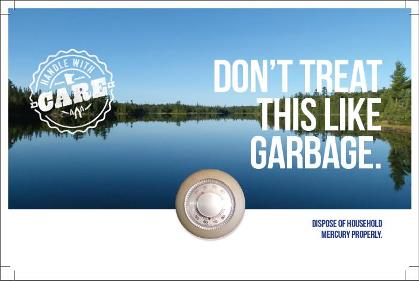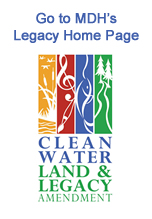Clean Water Fund: Contaminants of Emerging Concern (CEC)
MDH Legacy Initiatives
- Clean Water Fund Home
- Contaminants of
Emerging Concern - Groundwater Protection Initiative - Accelerated Implementation Grant
- Groundwater Restoration and Protection Strategies (GRAPS)
- Pathogen Project
- Private Well Protection
- Source Water Protection Planning and Grants
- Water Reuse
Related Topics
Environmental Health Division
Outreach and Education Grants 2013
Clean Water Fund
Award Amount: $27,000 - Project In-Progress
Clean Water Fund is a national nonprofit organization based in Washington D.C. that encourages grassroots environmental leadership on issues such as cleaner water and air. The Minnesota chapter of Clean Water Fund is especially focused on environmental issues surrounding water.
The Minnesota chapter of Clean Water Fund is using grant money to meet with drinking water systems to learn about the systems’ current programs addressing contaminants and assessing if the systems would be interested in a broader collaborative effort on the issue. They will convene a steering committee made of representatives from water systems, trade associations and Clean Water Fund members. This committee will design a plan for a larger meeting of interested groups to discuss current activities and joint strategies for addressing CECs. These meetings will lay the ground work to deal with broader contamination and infrastructure issues.
Friends of the Mississippi River
Award Amount: $28,775 - Project Completed
Friends of the Mississippi River is a citizen volunteer organization that works to protect the Mississippi and its watershed in the Twin Cities Area. They work in the areas of land conservation, watershed protection, and river corridor stewardship in relation to the Mississippi River in the metro.
Friends of the Mississippi River conducted a qualitative consumer research survey of 80-100 adults with their MDH grant. This survey gauged public attitudes and assumptions about the use of personal care products that include triclosan, a chemical shown to have negative effects on health and the environment. With their results and additional research, Friends of the Mississippi River created a report recommending specific educational strategies and methods that can be used to effectively educate the public about triclosan. These recommendations included aiming communications at adults under 50 and households with children. It also recommended that communications focus on the problems with triclosan and emphasize best practices for disease prevention. This report was presented at an educational workshop in spring 2014 attended by staff from MDH, Minnesota Department of Agriculture, Minnesota Pollution Control Agency, and several local non-profit water advocacy organizations.
Western Lake Superior Sanitary District
Award Amount: $42,800 - Project In-Progress

Western Lake Superior Sanitary District (WLSSD) provides solid waste oversight and wastewater treatment services for a 530 square mile region around Duluth, Minnesota. It is a special purpose unit of the government created to address serious environmental pollution in the lower St. Louis River Basin, and has been nationally recognized for its pollution prevention programs.
With MDH grant funds, WLSSD has created a CEC toolkit that provides local household hazardous waste and local public health programs with high-quality, consistent messages to create public information appropriate for communities statewide. The toolkit promotes identification, proper use, and proper disposal of toxic chemicals. It also promotes alternative products and practices to reduce the use of toxic chemicals.
